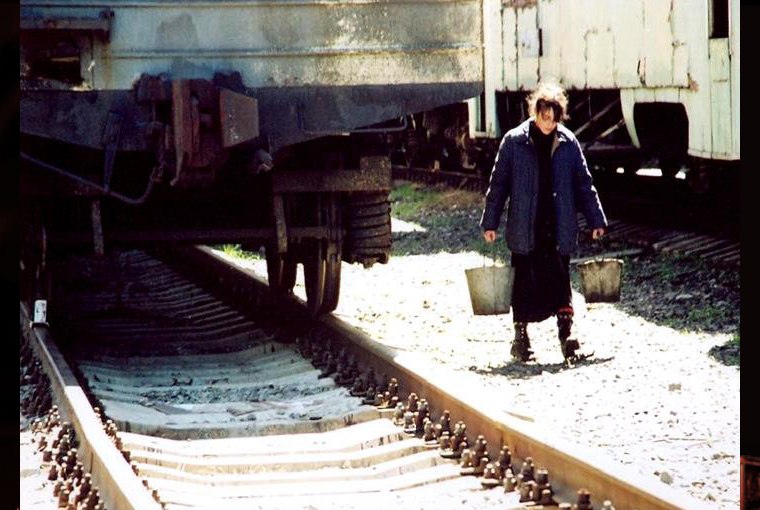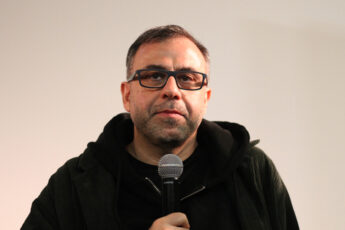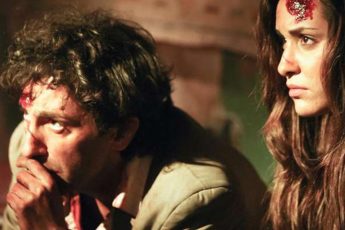Turning into Ashes
Levan Zaqareishvili’s Tbilisi, Tbilisi (Tbiliso, Tbiliso, 2005)
Vol. 51 (March 2015) by Anna Batori
Tbilisi, Tbilisi, here people have stones instead of hearts,” remarks the protagonist of Levan Zaqareishvili’s last film and indeed, the Georgian director guides us through a ruthless, corrupt and poverty-stricken universe, the very desperate reality of a country’s post-socialist, post-war period. In this regard, Tbilisi, Tbilisi functions as a universal portrayal of the Caucasian decay caused by the dissolution of the Soviet Union and – in Georgia’s case – by the Abkhazian and South Ossetian conflicts. In this post-apocalyptic world, it seems that the only way to survive is to resort to aggression, corruption or robbery that make Tbilisi a place full of danger and crime.
Zaqareishvili’s story is set in a market place that serves as the meeting point and workplace for the film’s characters. Professor Otar – in actuality a well-respected scholar in film studies – sells margarine, meanwhile aiding an old beggar who is in constant need of shelter. The marketplace also gives work to pickpocket Tedo, who shares his daily income with his accomplices and the local policeman. Similarly to the countless beggars and corrupt officials, Tedo’s sister Elza, a prostitute, makes a living from the market’s customers. Besides their spatial and economical proximity, these characters are connected by filmmaker Dato, who is struggling with a screenplay and visits the market frequently to get equipment for his films. This is where he first meets the characters who then serve as protagonists to both Zaqareishvili’s and his own movie.
Thus, besides Dato’s macro-plot which serves as the narrative kernel to which Zaqareishvili constantly returns, we witness how several consecutive stories intertwine and later coincide. All of these episodes refer to the corrupt leadership and common man’s poverty, depicting Tbilisi as a dystopian place where nobody seems to practice the profession of their calling and wrongdoers fear no punishment for their misdeeds. Except for the margarine-selling professor, most characters are young orphans who roam around the market place without any parental guidance.
Still, the people of the marketplace are strongly connected and dependent on each other: Tedo and his gang live from robbing others, the policeman has his share of the robbed goods and jewellery, while Nona and her brother – another two marketplace orphans – beg for spare change. In the course of the story, Tedo’s gang takes Nona’s money and destroys her goods, Elza is hit by her brother and Tedo is himself beaten up by the local policeman. The symbiosis of the younger market-people only features aggression and physical abuse and results in the death of Tedo, which seems as unnecessary and sad as that of those fallen in the course of the wars that struck Georgia after 1989.
The message of inevitable havoc and ruin returns in the film’s last sequence when Tedo falls onto his pulled knife while trying to protect his drummer friend. What is worthy of note here is that the young thief falls on his knife by himself and not at the policeman’s hand, which opens up a new debate in the film’s interpretation: Zaqareishvili suggests that Georgians have themselves become their biggest enemies, making a rod for their own backs and riding roughshod over others.
Tbilisi, Tbilisi works with a tricky, ensemble narrative that unfolds Dato’s everyday life as he is looking for a story, meanwhile projecting all the happenings he has written so far. The episodes thus run parallel throughout the film and merge with the filmmaker’s own story when the latter finishes and reads his screenplay to his girlfriend, thus revealing Tedo’s death. This is the point when the connection between Dato’s script and the story of the market’s characters gets revealed, thus mixing the filmmaker’s plot with Zaqareishvili’s fiction. Indubitably, this ensemble narrative form is a direct, self-reflective action, an intermedial gesture that refers to the shooting process and the death of cinema itself. “Filmmaking is dead,” Dato says in reply to the question whether he still makes films or not. However, in this case the end does not constitute a lack of stories that could be told, but the demise of a financial and moral background that would be needed for creation. Thus, in contrast to the great modernist crises (Fellini, Wenders, Tarkovsky), Dato’s problem is both materialistic and political. That is, he has no money for shooting and refuses the equivocal opportunity he gets from the custom-house officer. In this way he remains a filmmaker who rebels against the commercial and deeply corrupt system that surrounds him, though at the same slowly losing himself while falling prey to alcoholism and encumbrance.
Later on, Dato literally finds the story of Tbilisi, Tbilisi in the streets of Tbilisi, thus recalling the self-reflexive genre of city-films. In contrast to the already mentioned modernist filmmaking trends, the urban environment in Zaqareishvili’s case has no personality, history or emblematic symbol though. Rather, what makes Tbilisi a special place is the common narrative of its inhabitants, which is marked by their personal struggle. (Dato’s Vertovian observations – that later mesh with the narrative – could potentially offer a peaceful, silent approach to Georgia. However, they cannot change the poverty and decay of the present. For this, as Zaqareishvili suggests, there is no point to resuscitate cinema that – akin to the country itself – is nothing but dead. This is why the professor gives away the manuscript of his dissertation and that’s what Dato does to his finalized script.)
The difference between Dato’s sequences and the remaining ones is also communicated visually, that is, through the changing of tone and colours. Except for the scenes of the filmmaker, all sequences are in black and white (again a self-reflexive gesture that refers to the silent era). Zaqareishvili thus divides the film into four greater sequences that each feature the story of one of the market’s heroes/heroines and then cut back to Dato’s struggles. We see the filmmaker drinking in the market’s central pub, and witness his vicissitudes at the police station as he is later beaten up by officials for rebelling against the leadership: Dato rejects the opportunity to make a film on Georgia’s custom relations. What is more, he yells at the officer that offers him the possibility to earn some dirty money that way. Thus the director’s life does not differ much from that of the market’s protagonists: he too urgently needs money to survive and, similarly to Tedo, is under constant physical terror. The allegorical market place – that signifies Georgia – is a place where one cannot protest or commit any voluntary act, but must instead remain in silence and abide by the system-provided framework.




Leave a Comment